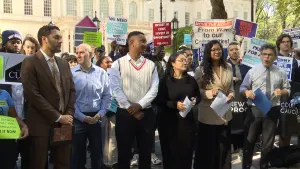More Stories
NEW YORK (AP) — With COVID-19 cases spiking in New York City, city officials said Wednesday they’re opening more testing sites and restricting visiting at city-run hospitals and jails.
At the same time, Mayor Bill de Blasio said no decision had been made to ban people from the annual New Year’s Eve celebration in Times Square — even as Fox said it was canceling its live broadcast.
There were more than 13,700 positive tests in the city on Monday, a massive surge from just a week before, when the city was averaging fewer than 3,600 new cases of COVID-19.
De Blasio said the city was opening seven additional testing sites on Wednesday, increasing its total to 119, and will set up five distribution sites Thursday to hand out at-home rapid tests.
The news of more city-run testing sites came as CityMD, the privately run chain of urgent care clinics, said it was temporarily closing 13 city locations, saying it was doing so “to preserve our ability to staff our sites.”
The chain has seen testing lines wrapping around city blocks and wait times of several hours.
The city is limiting visitation at city-run hospitals, with some exceptions for pregnant people, children and hospice patients, and moving from in-person visits to televisits at city jails, where the COVID positivity rate has soared from 1% to 17% in the last 10 days.
The city's jails commissioner, Vincent Schiraldi, sent a letter to judges Tuesday asking them to consider alternatives to incarceration, writing that inmates face “an equal or greater level of risk” as at the start of the pandemic.
According to Schiraldi, just 45% of city inmates have received one dose of the vaccine, and only 38% are fully vaccinated. In comparison, at least 90% of city adults have received one dose of the vaccine and more than 82% are considered fully vaccinated.
More from News 12
2:34

Guide: Safety tips to help prevent home burglaries
2:19

Guide: Safety measures to help prevent fires and how to escape one
2:40

Mayor's budget cuts: A controversial solution amidst immigration crisis
2:07

Tips on how to avoid confrontation with sharks while swimming in the ocean
2:33

5 tips to prevent mosquito bites and getting sick from viruses
2:39
